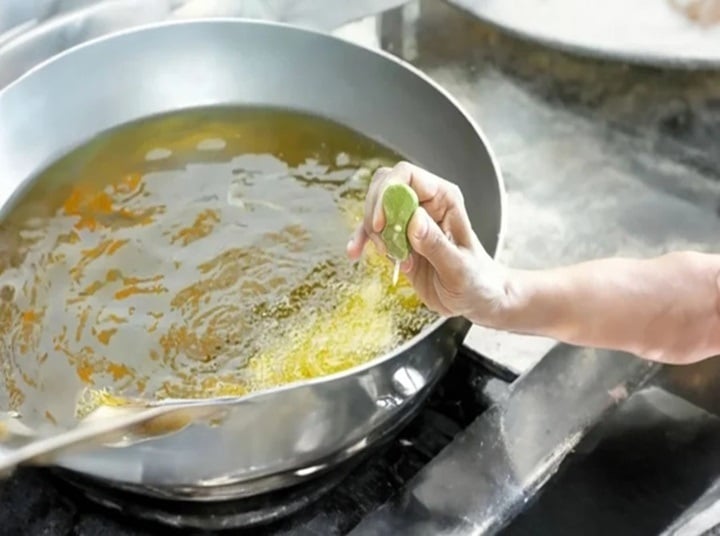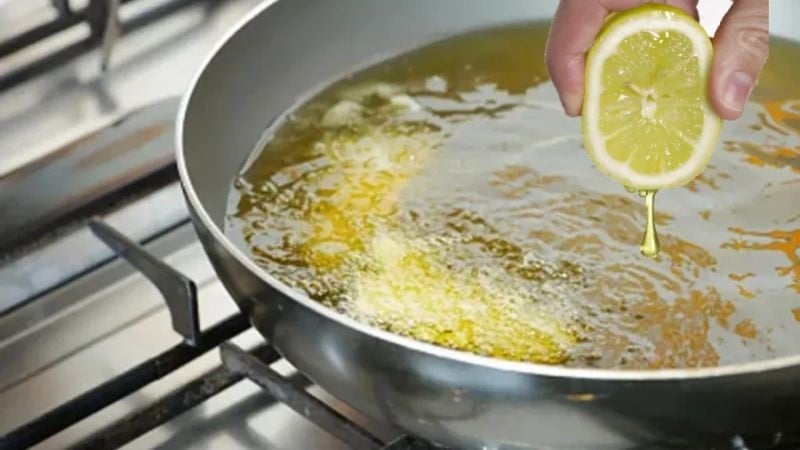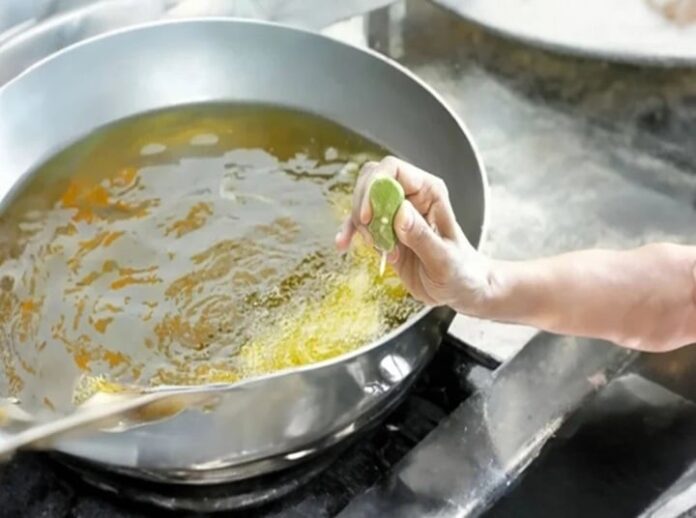Why Do People Add Lemon Juice to the Pan When Frying?

Frying with Lemon Juice: Achieve Golden Crispiness Without the Mess
Frying foods can often result in a messy situation with oil splattering everywhere. A simple yet effective solution practiced by many is to add a few drops of lemon juice to the pan. But why does this trick work so well?
The main culprit behind oil splattering is the presence of water in the food or oil itself. Water has a much lower boiling point than cooking oil (100°C compared to over 180°C). When water or water-containing food is introduced to hot oil, the water rapidly evaporates, leading to small explosions and oil droplets being propelled outwards.
When you add lemon juice to the frying oil, something interesting happens. The citric acid in the lemon juice creates a thin film on the surface of the oil when exposed to high temperatures. This film acts as an invisible shield, preventing the abrupt evaporation of water. Instead of a violent boil, the water from the food evaporates gradually and in a more controlled manner, significantly reducing oil splatter.
Apart from minimizing splatter, adding lemon juice to the frying oil offers several other advantages:
Non-stick effect: The thin film created by the lemon juice not only prevents splattering but also acts as a natural non-stick coating. It forms a barrier between the food and the bottom of the pan, preventing food from sticking during the frying process, especially useful when cooking sticky foods like fish, eggs, or tofu.
Enhanced crispness: The acid in the lemon juice interacts with the surface of the food, contributing to a crispier outer layer after frying. This added crispness enhances the appeal and taste of the dish.
Odor neutralization: For seafood dishes, particularly fish, the fishy odor can be off-putting to some. Lemon juice, with its natural odor-neutralizing properties, helps reduce this unpleasant smell during frying. The dish will have a more pleasant and palatable aroma without the overpowering fishy scent.
The amount of lemon juice used in this trick is usually very small, just a few drops per batch of frying. This minimal amount ensures that the original flavor of the dish remains intact, without introducing a sour or overpowering lemon taste. You can rest assured that your food will not taste like lemons!
Tips for Frying with Lemon Juice
– Direct squeeze into oil: This is the simplest and most common method. Once your oil has reached the desired temperature, simply squeeze a few drops of lemon juice directly into the pan and proceed with frying as usual.
– Rub lemon on the pan: Another approach is to heat the pan before adding oil. Rub a fresh slice of lemon all over the pan’s surface for about a minute. This method also creates a protective layer, reducing both sticking and splattering issues.
– Marinate with lemon juice: For certain dishes, you can add a few drops of lemon juice to the food and coat it evenly before frying. This technique not only helps with splatter reduction but also enhances crispness and adds a subtle flavor boost.

Frying with Lemon Juice: Golden and Crisp Results
Additional Tips to Minimize Oil Splatter During Frying
Dry your food: Always ensure that your food is thoroughly patted dry or blotted with oil-absorbing paper before frying. Removing as much excess moisture as possible will reduce the amount of water that evaporates into the oil.
Add salt to the oil: Sprinkle a small amount of salt into the pan and swirl it around before adding your food to the oil. Salt has hygroscopic properties, meaning it attracts and absorbs water, helping to minimize splattering.
Use flour: Coat your food with a thin layer of flour or a specialized frying batter before frying. This layer will absorb moisture from the food, while also creating a crispy exterior.
Add flour to the oil: A less common but effective method is to add one to two tablespoons of flour, cornstarch, or frying batter to the hot oil and stir it in before adding your food to the pan.
The Perfectly Crispy, Golden Fried Fish: A Simple Trick for Delicious Results
Introducing the ultimate hack to prevent your fish from sticking to the pan – say no to salt or flour! Imagine flawlessly frying fish without the pesky issue of it sticking to the pan. Well, with this nifty trick up your sleeve, you’re well on your way to becoming a master chef. So, whether you’re frying up your favorite fillets or experimenting with a new recipe, remember this simple yet effective tip to keep your fish intact and your pan clean.
Why Add a Few Drops of Essential Oil to Your Floor Cleaner? It’s a Multitude of Benefits, and I’ve Only Just Discovered It!
The humble tiger balm, a staple in many households, is renowned for its potent blend of essential oils. With a distinct and pleasant aroma, it typically contains refreshing peppermint, zesty orange, or cooling menthol. These carefully selected ingredients create a unique and soothing fragrance that is instantly recognizable.






































